Faugh A Ballagh - An Irish AAR
- Thread starter Agent Larkin
- Start date
-
We have updated our Community Code of Conduct. Please read through the new rules for the forum that are an integral part of Paradox Interactive’s User Agreement.
You are using an out of date browser. It may not display this or other websites correctly.
You should upgrade or use an alternative browser.
You should upgrade or use an alternative browser.
Chapter 8
"The Italian campaign offers a very clear insight to the minds of Europes rulers in 1879. The French and Austrians were busy reinforcing their German borders and as such ignored the Sardinian-Sicilian war. The Germans didn't care as they were already embroiled in a conflict in Africa. As such it appeared Sardinia had no Allies to call upon. Until a longshot proposal to the British Empire for assistance paid off."
Ireland and the World, 1860-1900
"The Italian campaign offers a very clear insight to the minds of Europes rulers in 1879. The French and Austrians were busy reinforcing their German borders and as such ignored the Sardinian-Sicilian war. The Germans didn't care as they were already embroiled in a conflict in Africa. As such it appeared Sardinia had no Allies to call upon. Until a longshot proposal to the British Empire for assistance paid off."
Ireland and the World, 1860-1900
********
Right so were do we begin? The reason I am typing this in a good old fashioned non-narrator voice is simple. We need to talk. My original idea for this update was going to be interesting. It was going to be about how Britians demand for Hyuga so as to make Japan a Dominion state caused Ireland to seek greater autonomy to the point of becoming completely independent in Foreign Affairs. I was going to create a series of events like the commonwealth to keep the two nations allied while I ran around with a fully independent Ireland.
Have you noticed the usage of the Past tense there? Murphy's Law decided to pay me a visit and after a series of annoying events, culminating in me getting the flu, made this idea nearly impossible. As such i became rather disillusioned with this game and this AAR. I finally decided to load it up today to see what could happen and well I was surprised.
I still wound up losing Hyuga to Britain but the whole Japan becoming a Dominion series of events didn't work. However after that rocky start things started to look up. I was able to grab a rather large chunk of the Pacific atolls and some Economic goodness combined with a few good techs meant my country was doing ok. I didn't take screenshots because I was still feeling disheartened.
Then the Italian Campaign began. I shall discuss that In Character but needless to say it came out of nowhere and has me updating again.
********
On August 18 1878 the British Empire declared war on the Kingdom of Two Sicilies after negotiations with Sardinia-Piedmont. On July 10 1879 the hopes of Italian Unification were forever destroyed. Two Sicilies was caught in the unfortunate circumstances of the British Empire needing to give a warning to Germany not to interfere with the affairs of Europe and Africa, and of massive numbers of battle-hardened soldiers on their way back from a colonial dispute with Russia.
The First Imperial troops to land were Irish soldiers who quickly bolstered the defences of Sardinia-Piedmont before helping to push Sicilian forces out of Sardinia. While this was happening the Royal Navy landed massive numbers of troops all along the Italian coastline were they met little to no resistance due to the main body of Sicilian forces having been sent North to fight in Piedmont. Britain quickly defeated the Sicilians and demanded a heavy price in the peace-talks of the eleven month old conflict.
And so on July 10 1879 Britain destroyed the hopes of Italian nationalism and sent a strong message to the rulers of Europe. "Rule Britannia".
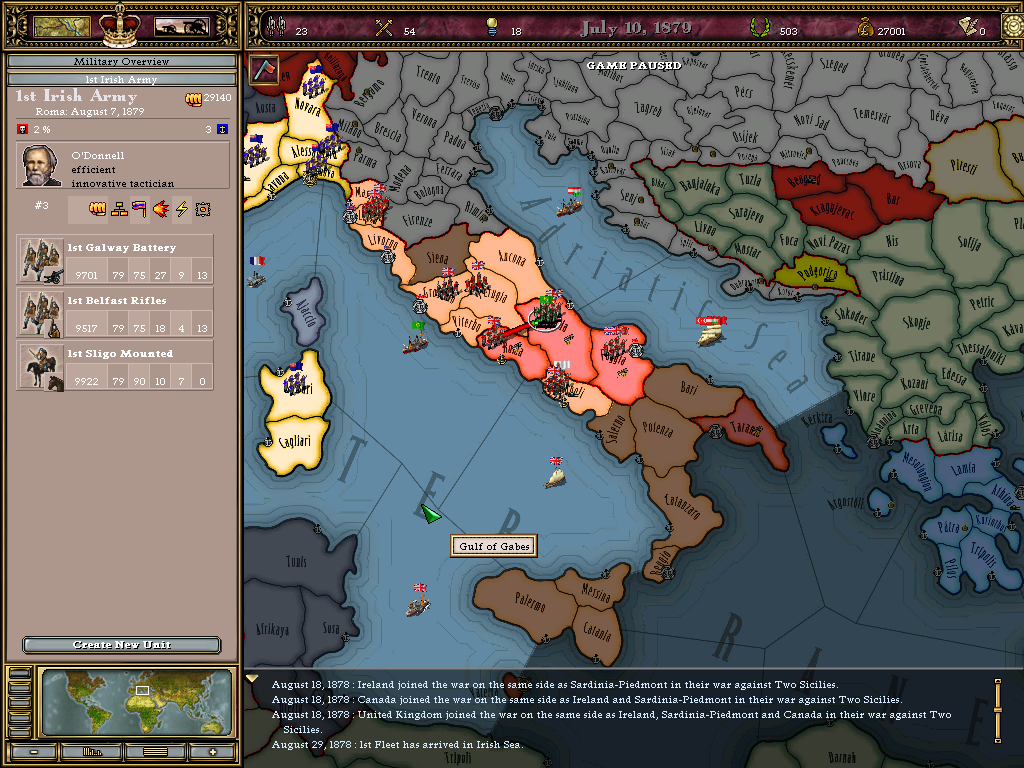
A protestant Rome?!? My word.
********
So comments? Criticisms? Molotov Cocktails?
So the British took Rome... I drool at the thought as to what this'll mean for the British Museum's collection... The Elgin marbles are going to look like child's play... 
It's hard to come up with a real-world rationale for these occupations, but hey! it makes for a good story! Those poor Italians, first they suffer at the hands of the Austrians, then the French neglect them, and finally the British deliver a body blow and make the Pope their respected guest...
Those poor Italians, first they suffer at the hands of the Austrians, then the French neglect them, and finally the British deliver a body blow and make the Pope their respected guest...
Consider turning over the British holdings in Italy to the Irish - after all, at least as far as religion is concerned, there is some affinity there.
Glad to see you decided to continue and looking forward to see how much further Vicky can wrench itself off the rails of plausibility.
It's hard to come up with a real-world rationale for these occupations, but hey! it makes for a good story!
Consider turning over the British holdings in Italy to the Irish - after all, at least as far as religion is concerned, there is some affinity there.
Glad to see you decided to continue and looking forward to see how much further Vicky can wrench itself off the rails of plausibility.
Very good as always (and you certainly have better luck with your leaders than I do.  )
)
What is the status of the Pope under British rule?
What is the status of the Pope under British rule?
@Stuyvesant
Oh trust me the British are already ahead of you on that. The museums of London, and a few in Dublin, are anticipating many, many, many new pieces in soon. ITTL the Louvre will not be the most famous Art Museum in Europe.
You have no idea how surprised I was at the Peace settlement. The war was a foregone conclusion but I was expecting Britain to take Sicily (the island) or something along those lines. When I saw exactly what they took I laughed so damn hard. If it hadn't been for that I probably wouldn't have updated.
I'm toying with the idea of transferring Rome over to the Irish. The rest they can keep but an Irish controlled Rome might finally mean an Irish Pope.
@RossN
My leaders are lucky. I auto-create them but manually assign them and roughly 80% of the time they are bad. However the 20% makes up for it and are always the ones I pick.
The pope under British rule is peculiar. Ever since Catholic Emancipation and especially the Irish Home Rule Catholicism is accepted in Britain. However Britain is still a Protestant state. The Pope has been allowed back into Rome following a brief exile by the Sicilians due to his opposition to Italian Unification and is being all popey from the reduced Vatican. Reduced in that a lot of the art has been taken to Britain as war prizes.
While he is against the British theologically he isn't coming out and condemning them so Westminster is willing to leave him be. And may just pass it off onto Dublin to make it an Irish problem instead.
Oh trust me the British are already ahead of you on that. The museums of London, and a few in Dublin, are anticipating many, many, many new pieces in soon. ITTL the Louvre will not be the most famous Art Museum in Europe.
You have no idea how surprised I was at the Peace settlement. The war was a foregone conclusion but I was expecting Britain to take Sicily (the island) or something along those lines. When I saw exactly what they took I laughed so damn hard. If it hadn't been for that I probably wouldn't have updated.
I'm toying with the idea of transferring Rome over to the Irish. The rest they can keep but an Irish controlled Rome might finally mean an Irish Pope.
@RossN
My leaders are lucky. I auto-create them but manually assign them and roughly 80% of the time they are bad. However the 20% makes up for it and are always the ones I pick.
The pope under British rule is peculiar. Ever since Catholic Emancipation and especially the Irish Home Rule Catholicism is accepted in Britain. However Britain is still a Protestant state. The Pope has been allowed back into Rome following a brief exile by the Sicilians due to his opposition to Italian Unification and is being all popey from the reduced Vatican. Reduced in that a lot of the art has been taken to Britain as war prizes.
While he is against the British theologically he isn't coming out and condemning them so Westminster is willing to leave him be. And may just pass it off onto Dublin to make it an Irish problem instead.
Sad about all the unfortunate events, still I am glad you updated again. For some reason I found Britain controlling rome very amusing
Right I need a bit of help.
I'm trying to right an event so that Ireland will go to colonial war with *CENSORED*. Unfortunately my attempts to use commands aren't working. I've tried declare_war and prov_owner_war and neither have worked. Does anyone have any suggestions or is this just an after affect of being a Dominion?
I do have a work around but I would rather come up with a less gamey method.
I'm trying to right an event so that Ireland will go to colonial war with *CENSORED*. Unfortunately my attempts to use commands aren't working. I've tried declare_war and prov_owner_war and neither have worked. Does anyone have any suggestions or is this just an after affect of being a Dominion?
I do have a work around but I would rather come up with a less gamey method.
Last edited:
Sorry to say that I'd be less helpful than a wet paper towel in the Titanic, but maybe someone can be of assistance in the Victoria - Scenarios and Modifications subforum?
Thanks but I think i'll go with my work around.
Expect update either tomorrow or day after.
Expect update either tomorrow or day after.
An overview of Ireland and it's Territories. 1880
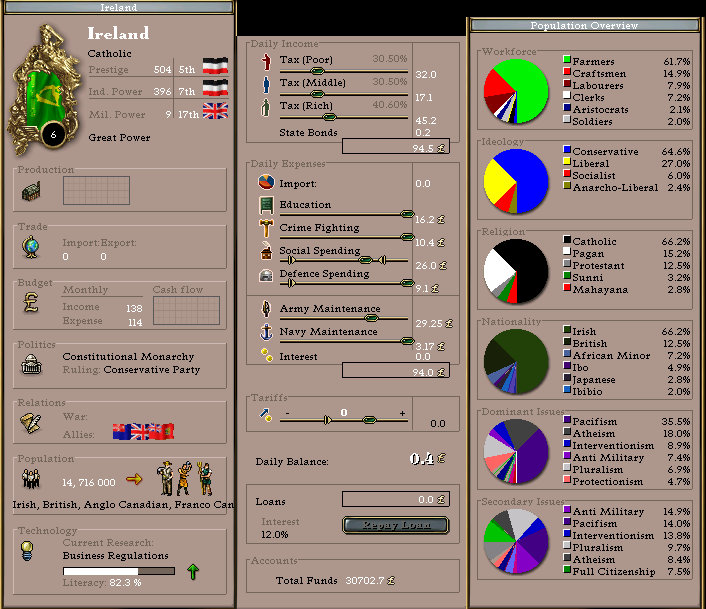
Capital: Dublin
Language(s): English, Irish (official), Japanese, Igbo
Government: Parliamentary Monarchy
Head of State: Queen Victoria
Head of Government: Prime Minister Joesph McNally (1)
Population: 14,716,000
Religion: While there is no Official Religion Ireland is still viewed as a Catholic nation.
Currency: Pound Sterling (£) (2)
Territories:
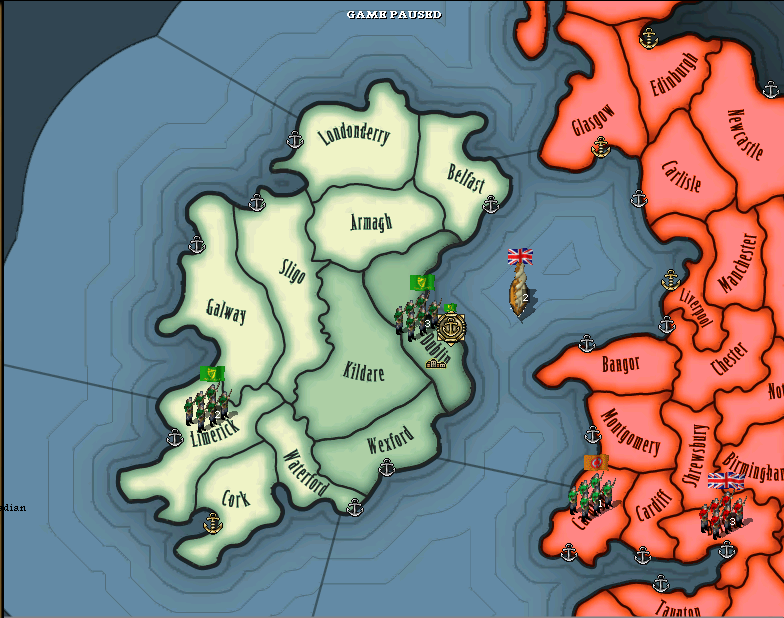
The Irish Home Island
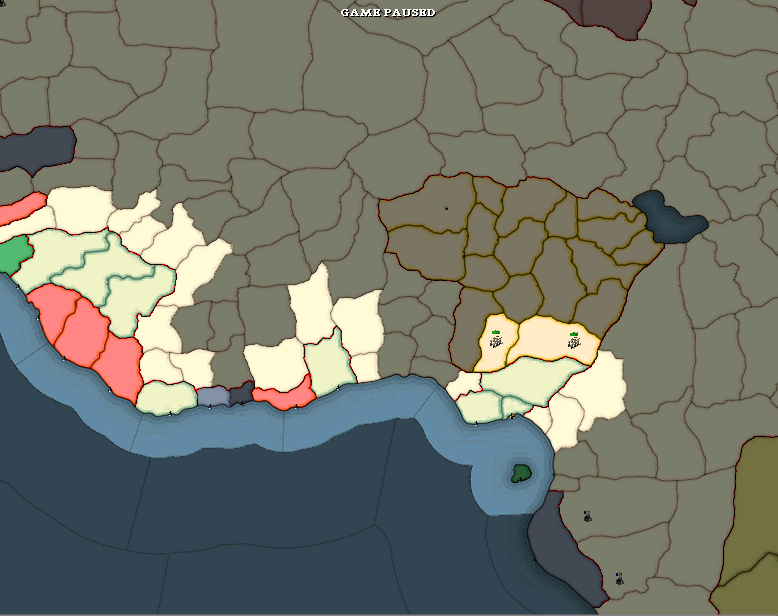
Irish West Africa
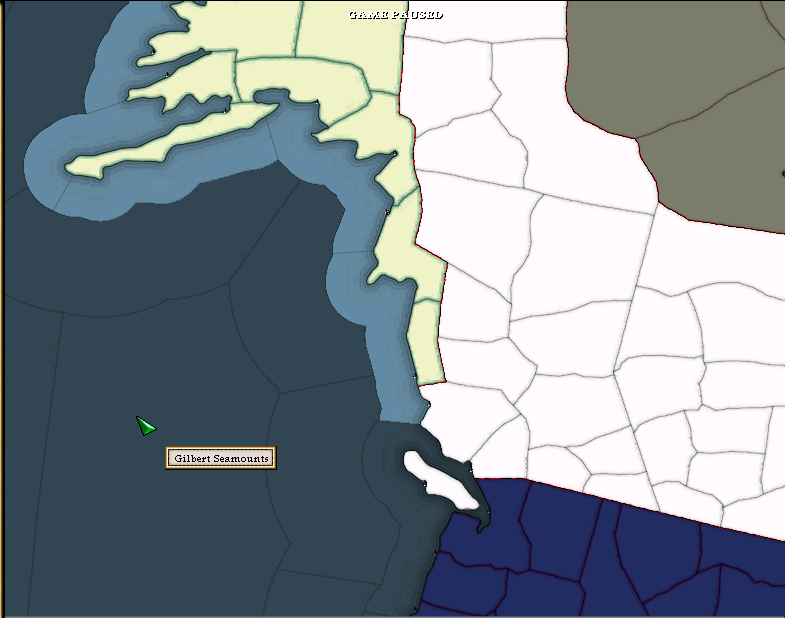
Irish Alaska
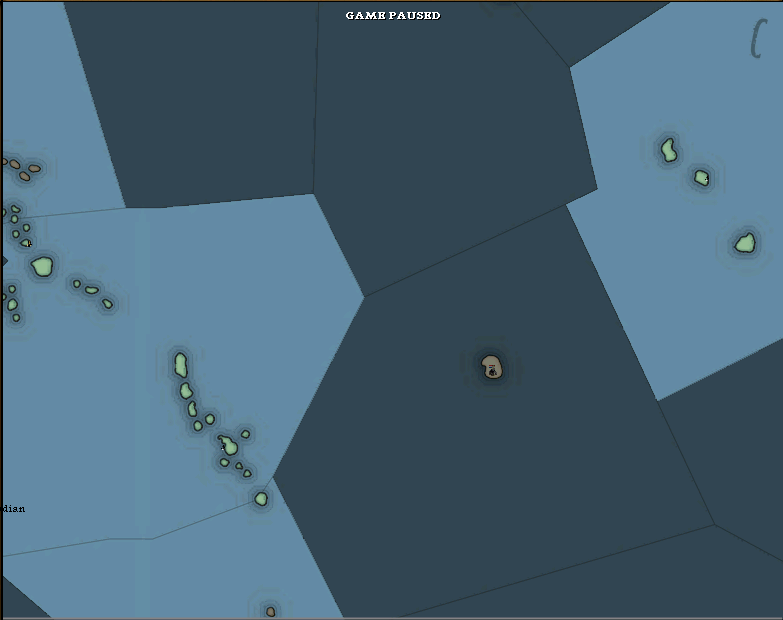
The Irish East Pacific
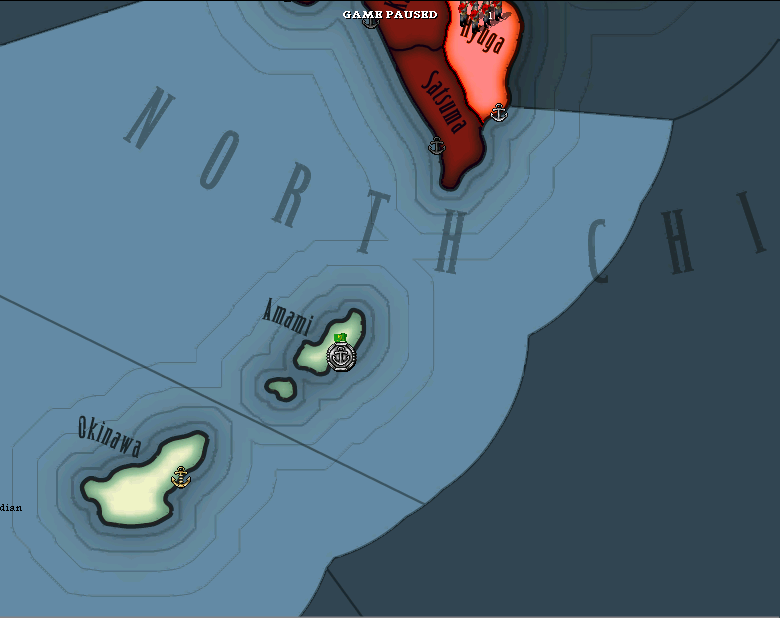
The Irish Orient
(1) Who is quite remarkable for being entirely fictitious.
(2) As issued on behalf of her Majesty by the Dublin mint.

Capital: Dublin
Language(s): English, Irish (official), Japanese, Igbo
Government: Parliamentary Monarchy
Head of State: Queen Victoria
Head of Government: Prime Minister Joesph McNally (1)
Population: 14,716,000
Religion: While there is no Official Religion Ireland is still viewed as a Catholic nation.
Currency: Pound Sterling (£) (2)
Territories:

The Irish Home Island

Irish West Africa

Irish Alaska

The Irish East Pacific

The Irish Orient
(1) Who is quite remarkable for being entirely fictitious.
(2) As issued on behalf of her Majesty by the Dublin mint.
Last edited:
Nice Empire!  How is the military situation?
How is the military situation?
(I'll post an overview of mine shortly.)
(I'll post an overview of mine shortly.)
Nice Empire!How is the military situation?
(I'll post an overview of mine shortly.)
The military is going dismally.
However the military is going to be addressed in today's update. Or more specifically it's future.
Chapter 9
"O'Donnell 28. Parnell 52."
Results of Conservative party leadership vote. 5 January 1880
"Parnell was to be the first truly Irish leader. He was the first Prime Minister who realised that what was good for Ireland might not necessarily be down the same path as Britain."
Ireland and the World, 1860-1900
"O'Donnell 28. Parnell 52."
Results of Conservative party leadership vote. 5 January 1880
"Parnell was to be the first truly Irish leader. He was the first Prime Minister who realised that what was good for Ireland might not necessarily be down the same path as Britain."
Ireland and the World, 1860-1900
On January 2nd 1880 Prime Minister Joesph McNally retired from politics after a severe health scare. This left the Conservative party in a lurch, government was meeting again on the 6th and not having a Prime Minister was out of the question however the majority of Conservative party members where already in Dublin and as such an emergency vote was called. The vote came down to two men, Joseph O'Donnell who was a Dublin industrialist and darling of Westminster who was known to spend more time in London then Dublin. On the other hand there was Charles Stewart Parnell, a conservative member of parliament for Alaska who in his career so far had been the assistant to the Governor of Alaska, had been heavily involved in establishing the Commonwealth agreement and had been a captain in the Irish navy serving during the war with Japan. He also had a very organised group of supporters and as such there was rapidly no contest. As such Charles Stewart Parnell was elected leader of the Conservative party and as such Prime Minister of Ireland.
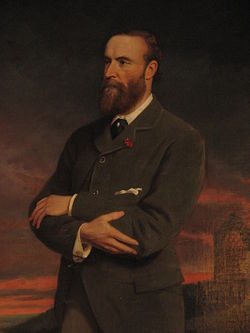
PM Charles Stewart Parnell
And the Nation was never the same again.
Parnell was quick to listen to his advisers regarding the stagnation of Industry in Ireland. To coincide with his views that Ireland couldn't always rely on Britain for Military support, he was in favour of expanding the Connaught steelworks and encouraging the Cork and Belfast shipyards. He also wanted to establish industry bases to make Ireland more self-sufficient in Industry. The two main industrial goods that Ireland was importing were Machine Parts and Paper and Parnell wanted this importing of these goods to end and for these goods to be produced in Ireland. These goods were mostly bought from Britain and when British industrial lobbyists managed to get Westminster to protest the ideas of these expansions Parnell replied with his now famous quote of "No man shall have the right to fix the boundary to the march of a Nation." (1) While this caused a few grumbled curses in Westminster protests against his plans were quickly dropped.
As well as his Industrial plans Parnell was responsible for over seeing the establishing of colonies in the Pacific. The Soloman Islands, Mikronesia and Eastern Polynesia quickly became part of the growing "Irish Empire" as well as planned expansion in Irish West Africa.
Then on December 25th 1880 an unexpected action on behalf of the Westminster government saw the most surprising thing happen to Ireland since the restoration of Home Rule.
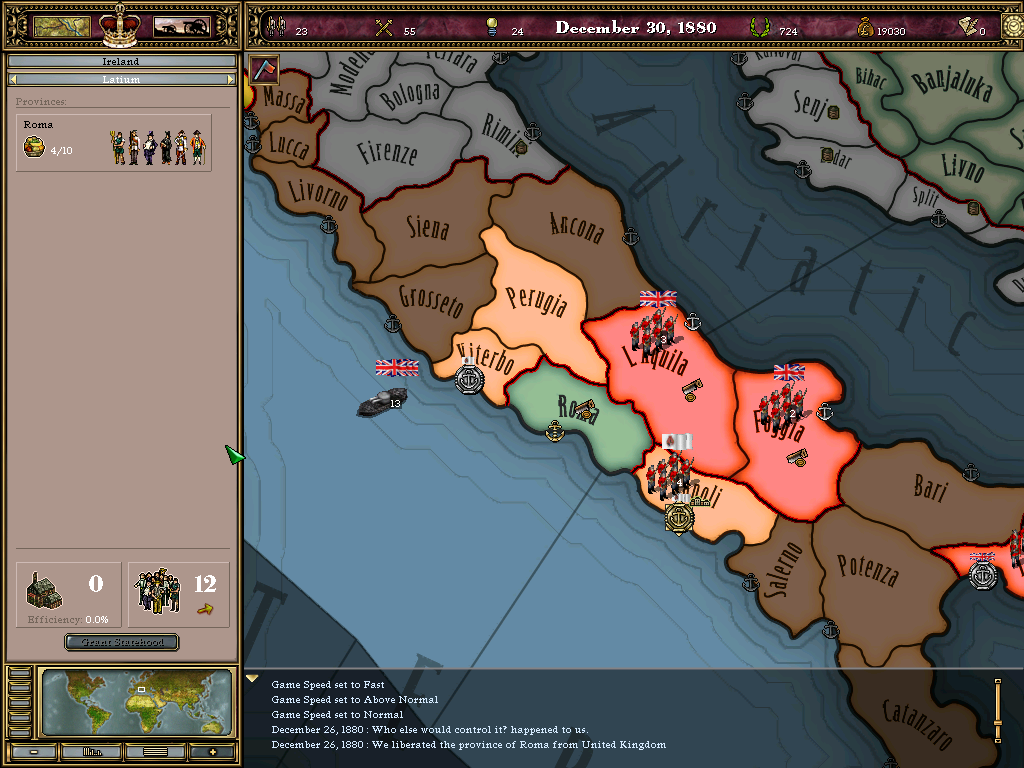
Ireland was given ownership of Rome. Following wide spread condemnation from Catholics internationally and military uprisings in Rome itself Britain faced the possibility of losing an extraordinary amount of face internationally. As such the Westminster government felt it would be wise to allow Rome to be controlled by a Catholic country and as Ireland was internationally recognised as one of the prime examples of a Catholic country(2) the Irish were chosen to be the new owners of Rome and the guardians of the Pope. Christmas mass in Dublin that year was understandably a bit more over the top then usual.
Following this momentous occasion Irish life quietened down. A general increase in Economic prosperity and new Industrial growth coupled with the establishment of the Irish colony of Namibia(3) saw a general peaceful existence fall across Ireland.
This peace was shattered on April 7th 1881 when three Irish sailors serving aboard the Merchant Vessel Irene were arrested and executed in Abu Dhabi for being drunk in public. In Dublin the public went mad. The press whipped up the masses into a Jingoist fury cling on the government to punish these backwards heathens, in Rome the Pope condemned the actions of Abu Dhabi as "an evil of Islam"(4) and all throughout the empire anger fermented at the actions of the Abu Dhabi authorities. Parnell appealed to the British government for permission to seek retribution and on April 10th received that permission. Unknown to Westminster was that Parnell planned to go ahead even without their permission. So on the 10th of April 1881 at four o'clock in the afternoon (Irish Time) Ireland declared war on Abu Dhabi.
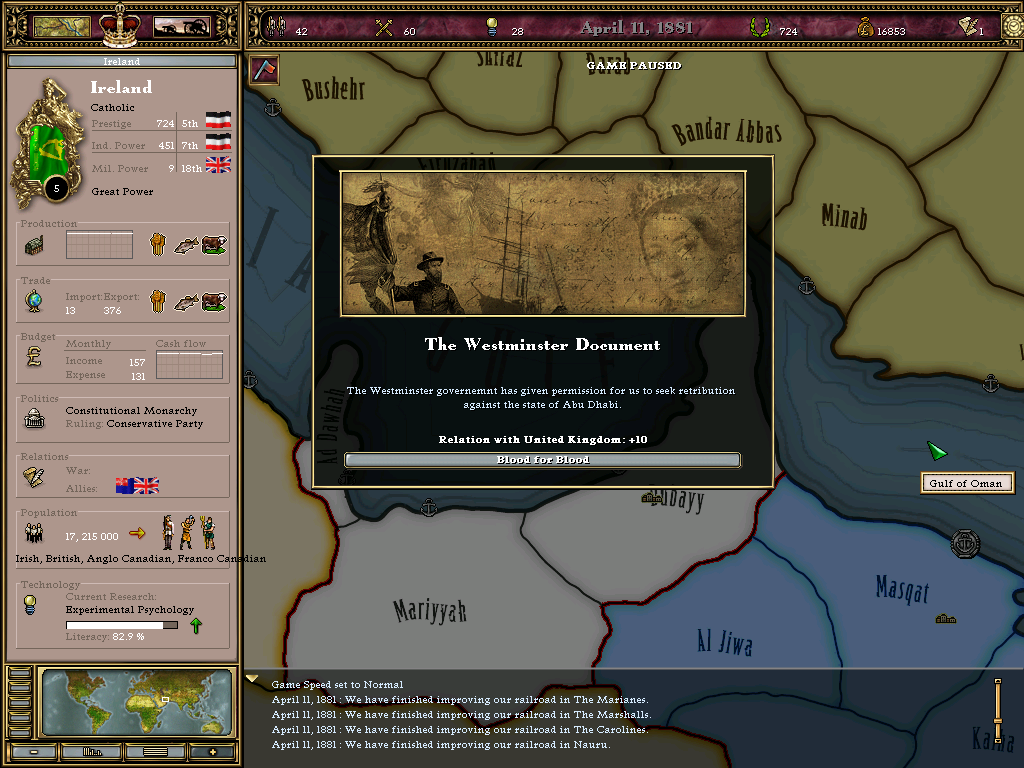
(5)
By September 28th Abu Dhabi was defeated, occupied and annexed into the Irish Empire. Apart from the establishment of the Vatican Guard in 1883 this would be the last exciting thing to happen to Ireland before 1885. However Parnell was waiting to take advantage of this new peace and territory. Riding on a wave of Nationalist glory the military started to expand.
Si vis pacem, para bellum
###########
Questions, Comments, Criticisms?
(1) Originally a quote in favour of Home Rule I think it works here as a quote to say that Ireland is growing up.
(2) Even though at this time it's Prime Minister is a Protestant and so is a good quarter of it's population.
(3) For the simple fact that I want Rhodesia and it's tobacco/Iron resources.
(4) The views of the Pope do not in anyway equal the views of the author.
(5) I needed an event that would give me a picture to take and I like to think that by waiting for approval the British would have been reassured that the Irish weren't going behind their backs and feel grateful. Also this marks the first of possibly many instance of Ireland being an independent nation for about three days so that it can get it's war face on.
Last edited:
So, is there a Masterplan to the Irish expansion, or are you gobbling up whatever pieces you can get?  I'm wondering about the benefit of adding Abu Dhabi... Bits of sand, potentially unruly natives, more sand... Is there any (future) oil there?
I'm wondering about the benefit of adding Abu Dhabi... Bits of sand, potentially unruly natives, more sand... Is there any (future) oil there?
Industrial expansion followed by military expansion - maybe you can finally repay the Scandinavians for the Viking depredations of years gone by? I look forward to learning what use you'll make of your shiny new toys.
Industrial expansion followed by military expansion - maybe you can finally repay the Scandinavians for the Viking depredations of years gone by? I look forward to learning what use you'll make of your shiny new toys.
Ze Master plan hm?
The master plan of Irish expansion can be basically summed up as follows:
We need resources. Abu Dhabi has one source of oil now and should have another one in the future. However one is all I need to get Ireland moving into 20th century. The natives are initially unruly but they will settle down to Irish peaceful understanding (That is do what we say or Mick'll bring you out the back and beat the life out of you.) The Pacific isles are only being taken to stop the Dutch getting them. In Africa South Rhodesia is the target.
The Scandinavians are not the next Irish target. Least of all because Sweden has had a very bad game so far. It has lost around four or five of its best provinces to Prussia and Russia is planning to invade. My shiny new toys have much better game in mind.
Parnell has plans. Lots of plans.
The master plan of Irish expansion can be basically summed up as follows:
We need resources. Abu Dhabi has one source of oil now and should have another one in the future. However one is all I need to get Ireland moving into 20th century. The natives are initially unruly but they will settle down to Irish peaceful understanding (That is do what we say or Mick'll bring you out the back and beat the life out of you.) The Pacific isles are only being taken to stop the Dutch getting them. In Africa South Rhodesia is the target.
The Scandinavians are not the next Irish target. Least of all because Sweden has had a very bad game so far. It has lost around four or five of its best provinces to Prussia and Russia is planning to invade. My shiny new toys have much better game in mind.
Parnell has plans. Lots of plans.
Chapter 10
"The Irish Economic situation during the 1880's rapidly changed following the introduction of the Irish Pound. Now no longer restricted in finances the Dublin government really began to start spending."
Ireland and the World, 1860-1900
"Money
It's a gas
Grab that cash with both hands and make a stash "
Pink Floyd, "Money"(1)
"The Irish Economic situation during the 1880's rapidly changed following the introduction of the Irish Pound. Now no longer restricted in finances the Dublin government really began to start spending."
Ireland and the World, 1860-1900
"Money
It's a gas
Grab that cash with both hands and make a stash "
Pink Floyd, "Money"(1)
The first major event to happen to Ireland was the Dubayy rebellion. A rebellious society of people decided that it was time to try and kick the Irish out of Abu Dhabi and try to restore the nation to it's former independent status. While to the Irish public this rebellion came as a shock it did not come as a surprise to the Irish Government. The government had been predicting a rebellion and had used the possibility of rebellion to convince the Westminster government to allocate to Ireland the funds necessary to raise a regional army loyal to Dublin to police Abu Dhabi.
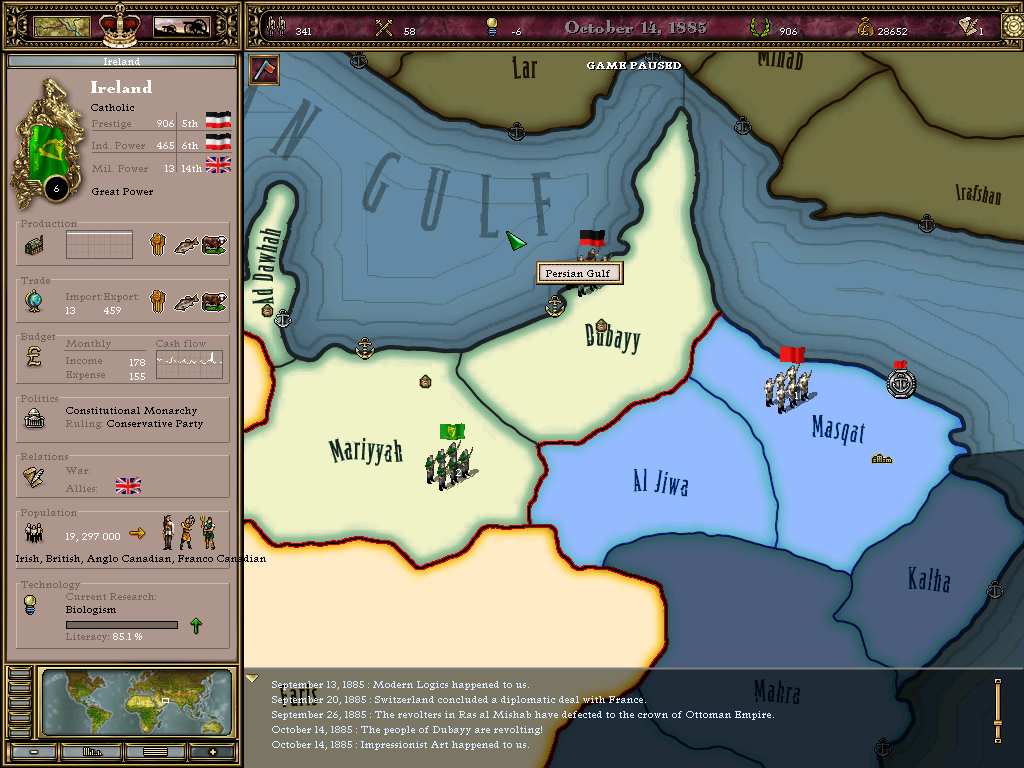
Bring it on you rebel scum
By November 28th the rebellion had been put down and the local government hoped that the population had been calmed down by a combination of the show of Irish force in the crack down and the light handed retribution of the Irish government. In the words of Parnell "If there is anything the Irish know it's rebellions."
However relations in Westminster and Dublin were about to have another serious blow. Resentment at the Irish colonial exploits in Africa had caused many members of the Conservative party to ask why the British Liberal party allowed Ireland to have access to enough money to usurp Britains position in Africa. While the Liberals attempted to counter argue a bill was proposed and passed that would restrict the amount of money that Ireland was allowed to use in the form of cash issued by the Royal Treasury to the Dublin mint. As the bill approached the house of Lords to be signed into law Parnell struck back.
Parnell introduced a bill to the Dublin government that would see the introduction of an Irish regulated, minted and controlled currency that would be independent of the Royal treasury. The Westminster government had failed to make such an action illegal under the terms of the Home Rule bill of 1836 as such a scenario had been seen as impossible. However a new currency would be of no use if no-one would accept it. The British government began an International smear campaign designed to prevent the new "Irish Pound" from being accepted abroad. While Britain did have some success internationally in the nations of Two Sicilies and the United States of Central America Parnell's government had already been ahead of them. So when the Irish Pound began internationally trading on the 18th of March 1886 and was trading quite well on the Berlin, New York and Vienna stock exchanges Britain quietly accepted the fact that the Irish had carved financial freedom for themselves but did not officially recognize the currency until 1896. An unexpected by-product of this situation was that Canada gained significant financial gains by recognising the Irish pound and becoming the unofficial middleman between Irish and British companies looking to continue trading as before.
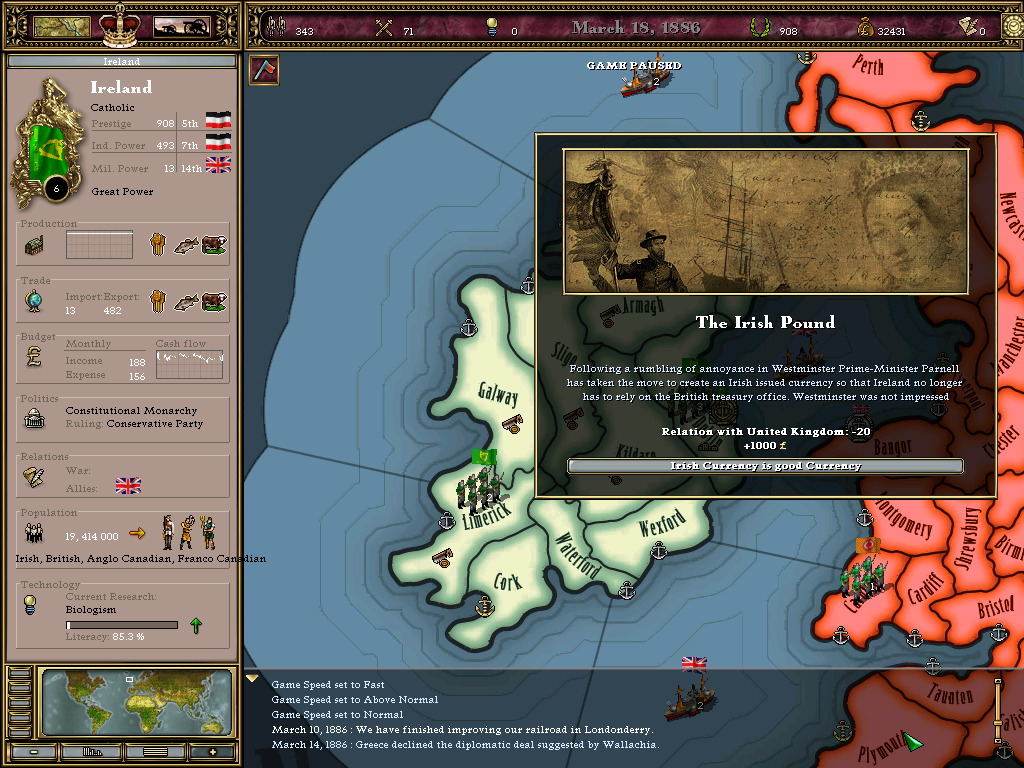
Seriously debating calling it the Punt or leaving it as the pound seen as how there hasn't been any real Gaelic revival TTL
This financial freedom was exactly what Parnell needed. He now had the means to significantly increase the size of Ireland's armed forces to be able to defend what was undeniably becoming an Empire within an Empire. The Dubayian guard had proven that a policing force recruited from the colonies was an effective way to keep an eye on the corners of the empire but before the Army could receive any significant new funding the Prime-Minister's old service would receive an overhaul.
The Irish navy in 1885 consisted of only three fighting ships and five transports. The Irish fighting ships were obsolescent at this time being only three commerce raiders but the Westminster government had refused to allow the funding of any significant increase in the amount of Irish naval tonnage. Now with financial freedom and the shipyards of Belfast and Cobh at his command Parnell intended to first double the number of Ireland's fighting ships and transports before 1890 but to quadruple the number of ships by 1900. The first orders went to the shipyards immediately for two Pre-Drednought's and four Protected Cruiser ships as well as three new Steamer transports. The Army had hoped that during this expansion to raise five new regiments but instead received funding only for two new regiments and only then if the were attached with proper headquarters so as to increase the effectiveness of the Irish army Battalions already in existence.
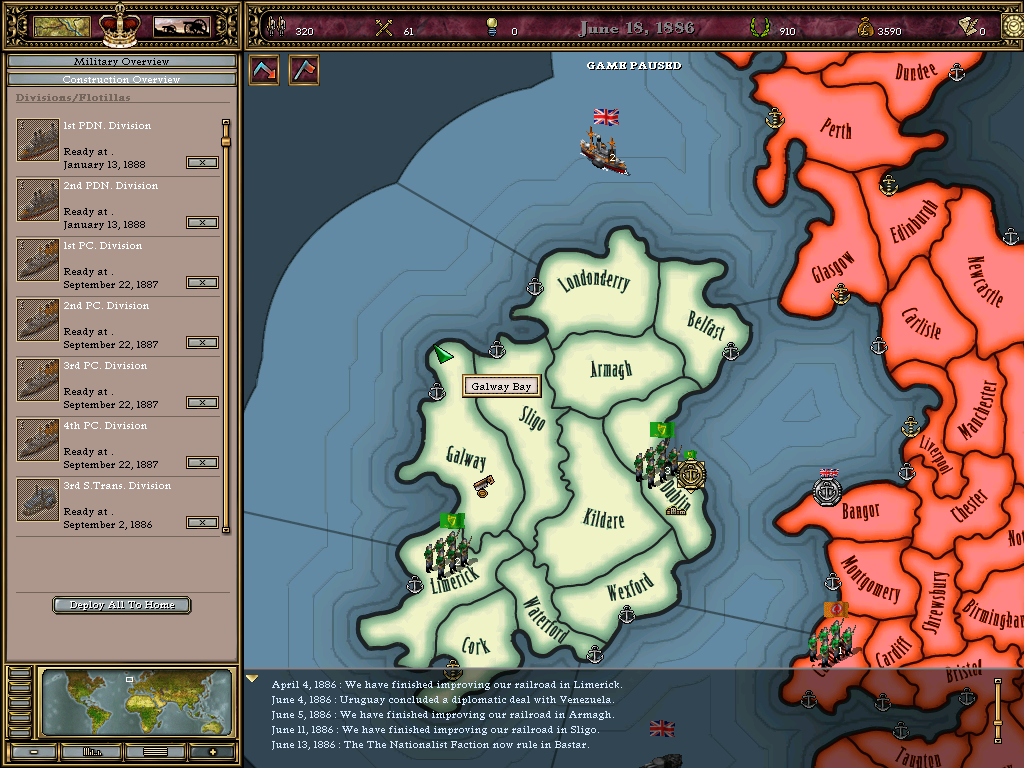
The Irish Naval Fighting ships in construction. Name suggestions welcome although two names are already reserved.
However contrary to the best efforts of the Navy the Irish army continued to grow in public popularity. Coupled with the expansion of Irish claims in West Africa and the Middle Congo the up surge in support saw the Army having to receive increased financial amounts to support a new division after enough recruits signed up that the military had no other choice. Thus was formed the 1st Dublin Volunteers on June 19 1887.
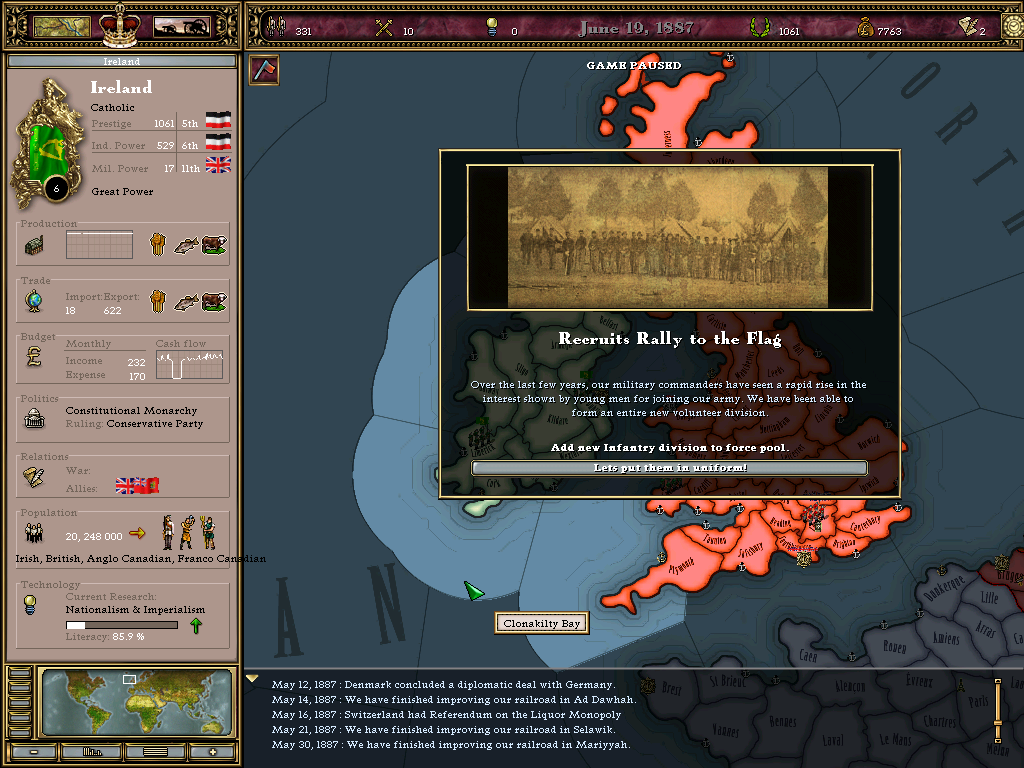
And none was more surprised then me.
Apart from the expansion of the Irish claims in South-Eastern Africa nothing of any real note would happen to Ireland before the year 1890. However tensions were starting to flare up in South Africa between the British and Oranje people. In Europe Denmark was looking nervously at it's souther border with Germany while Sweden watched the Russians to the North and the Germans in their territories they owned in Sweden. In Central America the USCA was starting to get torn apart by Nationalism and in Cuba nationalist were looking out America for help in their rebellion against Spain.
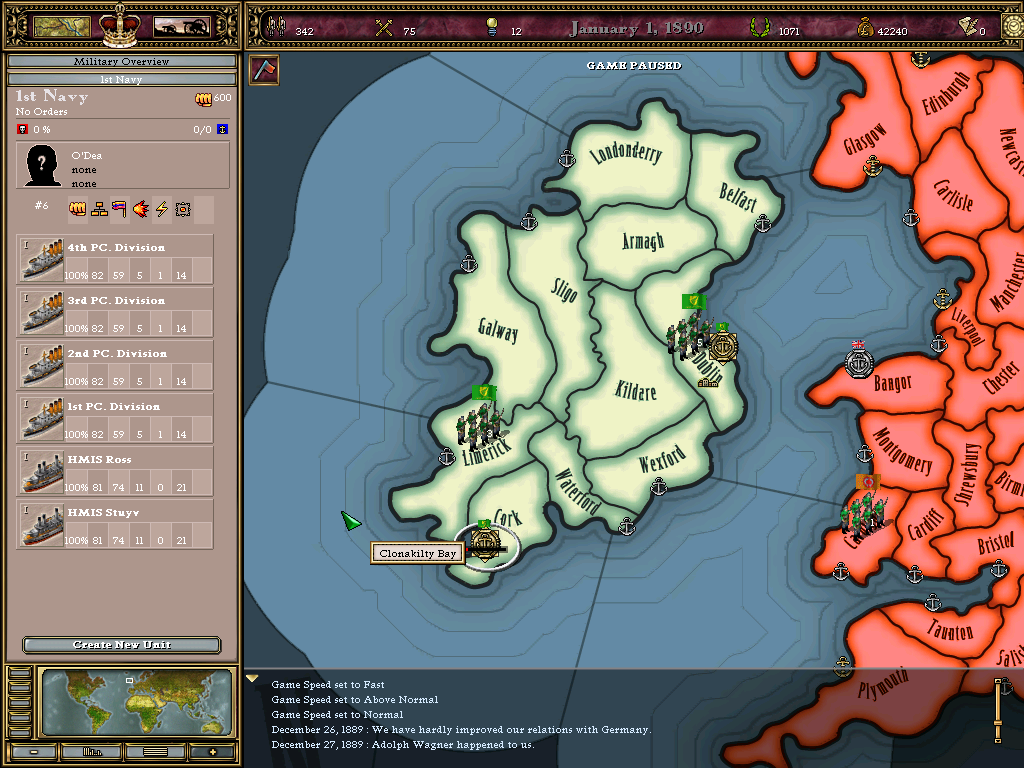
Pay close attention to the names of the Drednoughts. Awarded for constant useful comments.
##########
Questions, Comments, etc?
(1) = I couldn't resist.
@Regno: Thank you very much.
HMIS Ross! 
That's a very nice fleet. As for names there are a few options:
As for names there are a few options:
The real life option: Use actual names from the Irish Naval Service (ie. HMIS Róisín)
The mythological option: Use names from Irish myth (ie. HMIS Cú Chulainn)
The geographical option: Use province, county, city or river names (ie. HMIS Galway.)
It's also an idea to give different classes of ship a different system - my cruisers are named after Irish counties, my pre-dreadnoughts are named after mythology, my battle cruisers after dominions (Alaska, Patagonia...) and my dreadnought's after kings (Brian Boru).
Other options include battles - I'm saving those for my aircraft carriers (RIS Clontarf).
Oh and getting off ships for the moment great to see the punt arrive.
That's a very nice fleet.
The real life option: Use actual names from the Irish Naval Service (ie. HMIS Róisín)
The mythological option: Use names from Irish myth (ie. HMIS Cú Chulainn)
The geographical option: Use province, county, city or river names (ie. HMIS Galway.)
It's also an idea to give different classes of ship a different system - my cruisers are named after Irish counties, my pre-dreadnoughts are named after mythology, my battle cruisers after dominions (Alaska, Patagonia...) and my dreadnought's after kings (Brian Boru).
Other options include battles - I'm saving those for my aircraft carriers (RIS Clontarf).
Oh and getting off ships for the moment great to see the punt arrive.
Last edited:
Ah, HMIS Stuyv... It is lacking a certain Irish ring to it, but that's alright with me. 
Your shadow empire continues to grow and it's getting decidedly more teeth on it, too. And now financial independence, as well. Just <Erm> don't go crazy with the spending, eh? Don't want to end up like Greece...
Your shadow empire continues to grow and it's getting decidedly more teeth on it, too. And now financial independence, as well. Just <Erm> don't go crazy with the spending, eh? Don't want to end up like Greece...
@Ross
I'm going for place names generally for Transports and county names for the Cruisers.
For the dreadnoughts I'm thinking of people's names but Cu Chullain is already taken.
@Stuyv
Certainly but hey the soon to be introduced "Naval Gremlin" has a habit of messing with things such as names, ship orders.
Ireland go bad with it finances? Impossible I say.
I'm going for place names generally for Transports and county names for the Cruisers.
For the dreadnoughts I'm thinking of people's names but Cu Chullain is already taken.
@Stuyv
Certainly but hey the soon to be introduced "Naval Gremlin" has a habit of messing with things such as names, ship orders.
Ireland go bad with it finances? Impossible I say.

